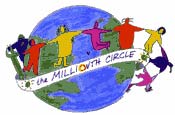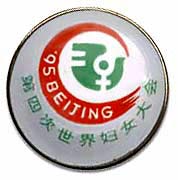Origins of 5WWC
 A contingent of 26 women from the Millionth Circle Initiative
went as NGO delegates to the United Nations for the Commission on the
Status of Women (CSW) meetings in 2002. There we learned no plans were
being made for a Fifth U.N. International Conference on Women. There
were several reasons given (in informal conversations): no country
had offered to host it; if another conference were held, the Bush administration
would try to weaken the Beijing Platform for Action (which they unsuccessfully
attempted in 2005 ); and the UN focus since 9/11 was concentrating
on global conflicts and potential conflicts. This was a time when U.N.
teams were still searching for weapons of mass destruction in Iraq.
It also seemed to those of us who went to the U.N. CSW that burnout
by hardworking women on frontline NGOs might also be contributing to
the apparent lack of energy for a 5th UN women's conference.
A contingent of 26 women from the Millionth Circle Initiative
went as NGO delegates to the United Nations for the Commission on the
Status of Women (CSW) meetings in 2002. There we learned no plans were
being made for a Fifth U.N. International Conference on Women. There
were several reasons given (in informal conversations): no country
had offered to host it; if another conference were held, the Bush administration
would try to weaken the Beijing Platform for Action (which they unsuccessfully
attempted in 2005 ); and the UN focus since 9/11 was concentrating
on global conflicts and potential conflicts. This was a time when U.N.
teams were still searching for weapons of mass destruction in Iraq.
It also seemed to those of us who went to the U.N. CSW that burnout
by hardworking women on frontline NGOs might also be contributing to
the apparent lack of energy for a 5th UN women's conference.
Beginning in 1975, previous conferences had been held every five and then ten years, in Mexico City (1975), Copenhagen (1980), Nairobi (1985), and Beijing (1995). Each had been larger and more significant than the one before. There was a widely held, mistaken assumption that the next one would be in 2005, ten years after Beijing. As there is a three-year lead time needed to plan and make arrangements, and with no plans on the drawing boards in 2002, this was obviously not going to happen in 2005.
There will not be one at all, ever
again,
unless new momentum can revitalize it!
 At every previous conference, women
came from all over the world, talked and bonded, learned from
each other, and formed a network of friendship and political alliances
on behalf of women. Most significantly, women's rights were recognized
as human rights in the Beijing Platform for Action. Until this
conference women were considered passive victims in an unequal
world. The conference addressed gender relations rather than women's
issues, recognizing that women's roles and status are equal in
relation to men. The word gender was challenged in Beijing by
countries that do not see women and men as equal human beings,
but as necessarily different sexes with fixed social roles. This
challenge was overcome. Governments agreed to promote gender equality
and women's empowerment in twelve areas of concern, and to report
progress in 2000 and 2005. For more information online, go to
www.google.com and search for "Beijing Platform for Action."
At every previous conference, women
came from all over the world, talked and bonded, learned from
each other, and formed a network of friendship and political alliances
on behalf of women. Most significantly, women's rights were recognized
as human rights in the Beijing Platform for Action. Until this
conference women were considered passive victims in an unequal
world. The conference addressed gender relations rather than women's
issues, recognizing that women's roles and status are equal in
relation to men. The word gender was challenged in Beijing by
countries that do not see women and men as equal human beings,
but as necessarily different sexes with fixed social roles. This
challenge was overcome. Governments agreed to promote gender equality
and women's empowerment in twelve areas of concern, and to report
progress in 2000 and 2005. For more information online, go to
www.google.com and search for "Beijing Platform for Action."
The next one could change the world Since Beijing, we have the internet as a means of easy global communication and connection. It gives us power at our fingertips to move ideas and funds, to mobilize and organize and make a difference. E-mails would facilitate meetings at a Fifth World Conference, and make follow-up and continuation easy. List-serves would make distribution of information immediate; websites and links among them would be invaluable. The value is getting things done through personal alliances and connections. Finding out who to reach and how is often only a matter of one to three degress of separation. More would be done for women by women.
